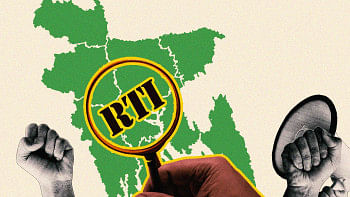RTI Act is on life support

Right to Information (RTI) Act in Bangladesh is in danger. We have had no information commissioner to implement the RTI Act for six months. Now, another ominous development looms large—the suspension and likely termination of US government-funded projects in the country following executive orders of US President Donald Trump. RTI projects are included.
However, this allows the nation to reflect on and act upon open governance, the main objective of RTI law. This is of such tremendous national importance that its advancement should not depend upon foreign funding. As the prime movers of the law, citizens of the country have kept it alive since its adoption 16 years ago. Alternative arrangements must be found for them to continue this important task.
Our youth who spearheaded the July 2024 uprising in the country, bringing new hope for the people, can use RTI to further their objectives. The formation of the new National Citizens Party (NCP) by them raises hope. Their commitment to the law may inspire other political parties—which have shown little or no interest so far—to follow suit.
Transparency in public officials' work and responsiveness towards citizens, which enhances their accountability and acceptance, are essential features of good governance. Let us discuss some ways RTI empowers citizens to seek relevant information from public officials, strengthening our democracy.
RTI and people's participation in governance
The basic premise of democratic governance is citizens' participation in its various processes. In representative democracy, citizens choose their representatives every four to five years through the election process. After that, they have little say in their representatives' responsibilities. The RTI Act allows them to engage in the governance process on a day-to-day basis, thereby allowing them to participate in governance matters. They use the law to monitor the activities of public officials and check if they are performing their duties with honesty and due diligence. The law obliges the latter to be responsive to citizens' requests for information. Election law and the RTI law are thus the two main pillars of democracy complementing each other.
RTI enhances people's access to governance mechanisms
Citizens' participation in the governance process is best served by their easy access to public offices, and RTI ensures such access. Using this law, citizens obtain information related to government documents, services, policies, financial activities, legal rights, schemes related to governance, etc. The knowledge they receive provides a basis for participating in governance matters.
RTI and transparency
Transparency in government work, a key objective of the RTI Act 2009, is also an essential feature of good governance. RTI ensures that public authorities operate more openly by granting citizens the legal right to seek information from them and serve as watchdogs. Citizens have used the law to uncover discrepancies in school management and many infrastructure projects where funds were allocated but not appropriately utilised. Many local communities have held school administrations accountable by obtaining budget reports, expenditure details, and the functioning of school managing committees.
RTI and accountability
Accountability is another core objective of the RTI Act. By facilitating access to information, citizens can scrutinise government activities and check their adherence to the law, holding government officials accountable to the citizens. A case study from Nilphamari demonstrated how an RTI request unearthed severe irregularities in the work of a local health centre where patients were not receiving free medications despite government provisions. Procurement records showed mismanagement and distribution inefficiencies, prompting corrective actions.
RTI and people's empowerment
RTI enables citizens to access relevant information from public bodies, allowing them to practically exercise their constitutionally recognised ownership of all powers of the land. They can make informed decisions on governance matters by utilising relevant information, including accurate data.
RTI and combatting corruption
A particular goal of the RTI Act is to deter corruption by exposing malfeasance. It serves as a tool to uncover and reveal information on corruption, which is the first step to fighting it and building an accountable system. In 2019, a farmer from Dinajpur sought information on government agricultural subsidies after he failed to access them despite repeated efforts. His RTI application revealed that the subsidies were diverted to non-farmers with political connections. The exposure led to corrective measures.
RTI and equality
Non-discrimination, equality, and inclusiveness are critical to establishing good governance and strengthening democracy. The RTI Act gives every citizen an equal opportunity to use the law and participate in the government's decision-making process. One of the most successful beneficiary groups of the RTI Act in the country is marginalised communities, who have used the law to obtain their rightful entitlements from the various safety net programmes of the country.
RTI and gender
The RTI Act has played an essential role in empowering citizens, especially women, to challenge systemic gender disparities and foster gender equality. After a media report in 2023 disclosed that pregnant and married female students were barred from staying in student dormitories, Bangladesh Legal Aid and Services Trust (BLAST) filed RTI requests to 38 public universities seeking their policies on such students. This revealed inconsistencies and discriminatory practices against female students. Based on this, BLAST filed a public interest litigation to the High Court. The court questioned the legitimacy of such discriminatory policies and directed universities to reconsider their regulations.
RTI and journalism
Journalists worldwide regularly use RTI as an investigative tool to access crucial information from public development projects. In one such example from Bangladesh, a journalist from Dinajpur utilised the RTI Act to uncover a counterfeiting scheme involving fake stamps. His efforts led to the revocation of licenses of fraudulent vendors and implementation of a a stricter monitoring system, thereby safeguarding government revenue and public trust.
Much of the last 16 years since the passing of the RTI law has been spent under autocratic rule. This is one reason citizens lacked trust in the government's commitment to the law. Under the changed circumstances now, we hope the law will receive the attention and support of the interim government and the governments to come to play an essential role in strengthening democracy and people's participation in governance. Given the tremendous value of the law in promoting these objectives, the interim government would do well by setting a precedent of engaging citizen groups, including NGOs, in implementing the RTI Act. However, the first thing to do is fill the three information commissioners' posts without further delay.
Dr Shamsul Bari and Ruhi Naz are chairman and assistant director (RTI), respectively, at Research Initiatives, Bangladesh (RIB). They can be reached at [email protected].
Views expressed in this article are the author's own.
Follow The Daily Star Opinion on Facebook for the latest opinions, commentaries and analyses by experts and professionals. To contribute your article or letter to The Daily Star Opinion, see our guidelines for submission.


 For all latest news, follow The Daily Star's Google News channel.
For all latest news, follow The Daily Star's Google News channel. 








Comments